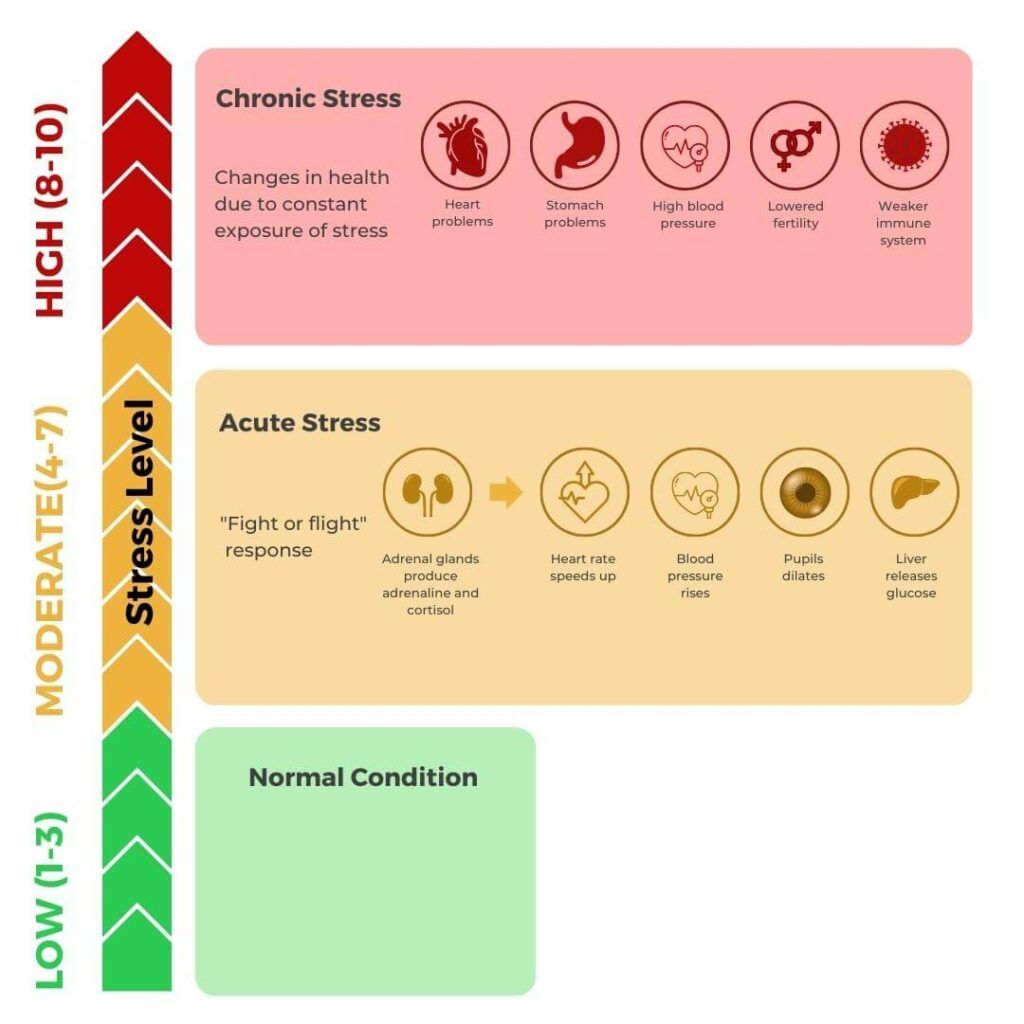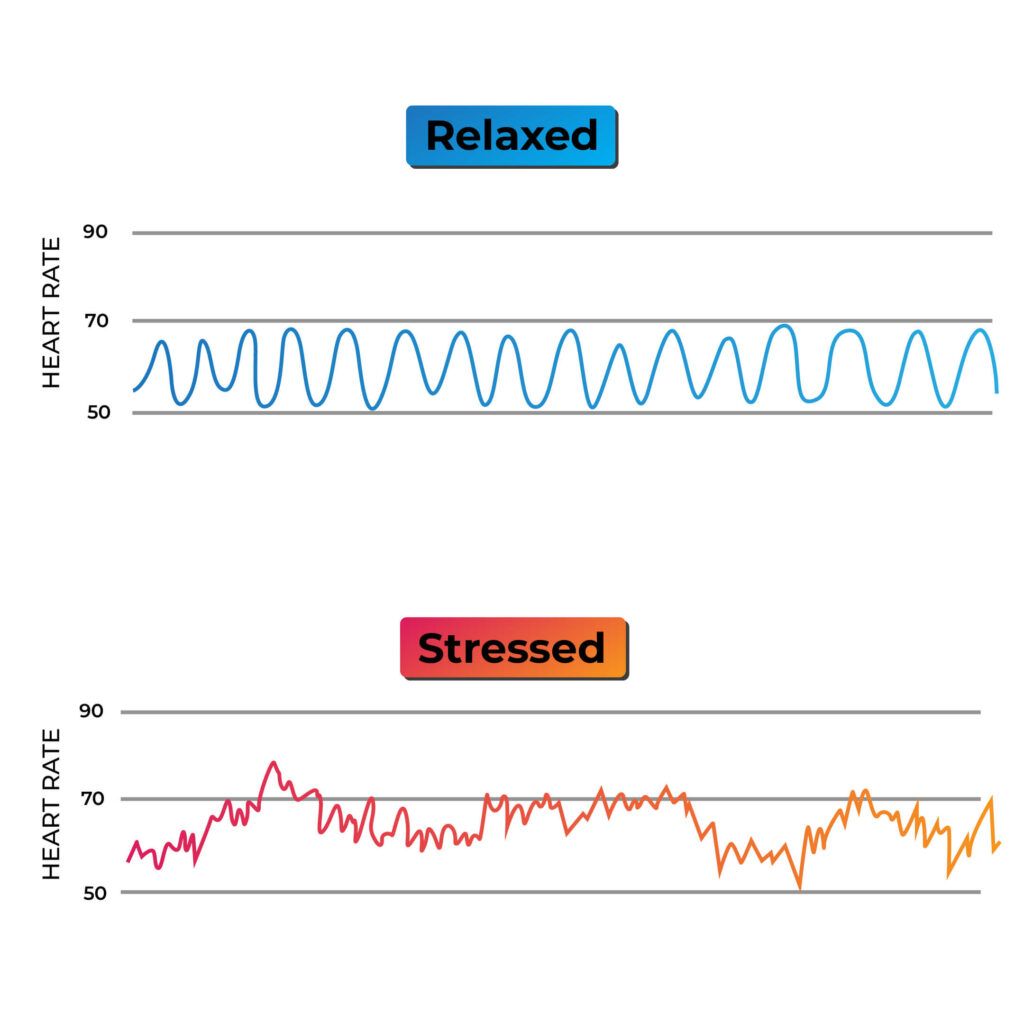Stress is a common problem that affects many people daily. It can manifest in different ways, such as physical symptoms, emotional reactions, or behavioral changes. However, measuring stress can be challenging because it is a subjective experience that varies from person to person. This article will explore different methods for measuring stress. We will also discuss the optimal ways to manage stress.
Did You Know That The COMT Gene Is An Important Stress Regulator?
Health Complications Arising Due To Excessive Stress
Excessive stress can lead to many health complications, both physical and mental.
Some of the most common physical health issues due to stress include
- Headaches
- Muscle tension and pain
- Fatigue
- Sleep disturbances
Stress can also lead to digestive problems such as stomach ulcers and irritable bowel syndrome, as well as heart disease and high blood pressure.
Mental health issues that can arise due to stress include anxiety and depression and more severe conditions such as post-traumatic stress disorder (PTSD).
Stress can also lead to cognitive problems such as difficulty concentrating and memory impairment.
Additionally, stress can exacerbate existing health conditions and make them more difficult to manage.
For example, people with asthma may experience more frequent and severe asthma attacks when stressed. Similarly, people with diabetes may find that their blood sugar levels become harder to control when stressed.
Stress can also lead to unhealthy coping mechanisms such as overeating, smoking, and alcohol or drug abuse.
These behaviors can further worsen health and create a cycle of stress and unhealthy coping.
Overall, excessive stress can seriously affect our physical and mental health, and it's important to manage and reduce it to maintain overall well-being.
By identifying the causes of stress and learning to manage them, we can reduce the risk of developing health complications and improve our quality of life.
How Can You Measure Stress Levels?

Stress is a normal part of life, but when it becomes chronic, it can negatively affect our physical and mental health.
Measuring stress levels can help us understand when our stress is overwhelming and take steps to manage it.
Here are a few different ways to measure stress levels:
- Self-Report Measures: These are questionnaires or surveys that ask individuals to rate their stress levels.
Examples include the Perceived Stress Scale (PSS) and the Depression, Anxiety and Stress Scale (DASS).
These measures can be useful in identifying symptoms of stress and assessing the effectiveness of stress management interventions.
Perceived Stress Scale
The PSS is a 10-item self-report questionnaire that assesses the degree to which respondents view their lives as unpredictable, uncontrollable, and overloaded during the past month.
The PSS score ranges from 0 to 40, with higher scores indicating greater levels of perceived stress. The
PSS has been used in a wide range of populations, including students, employed individuals, and clinical populations.
Depression, Anxiety, and Stress Scale
DASS is a 42-item self-report questionnaire that measures the three related negative emotional states of depression, anxiety, and stress.
Professor Neville Anthony Yeomans, a clinical psychologist at the University of New South Wales, Australia, developed the DASS.
It is designed to be used as a clinical assessment tool for individuals seeking help for emotional difficulties and as a research tool for investigating the emotional states of different groups of people.
The DASS has been found to have good reliability and validity. It has been used in many research studies, including depression, anxiety, stress, and other mental health conditions.
- Physiological Measures: These measures assess changes in the body that occur in response to stress. Examples include heart rate, blood pressure, brain waves, and cortisol levels. Cortisol, also known as the "stress hormone," can be measured through saliva, blood, or urine tests. Elevated cortisol levels can indicate chronic stress.
Heart rate variability
Heart rate variability (HRV) is often used to measure stress levels. The autonomic nervous system, which controls the body's unconscious actions, such as heart rate, breathing, and digestion, is heavily influenced by stress.
When an individual is stressed, the sympathetic nervous system, which is responsible for the "fight or flight" response, is activated. This leads to an increase in heart rate and a decrease in HRV.
Conversely, when an individual is relaxed, the parasympathetic nervous system, which is responsible for the "rest and digest" response, is activated. This leads to a decrease in heart rate and an increase in HRV.
Measuring HRV can provide insight into an individual's stress level and how well they can manage it. HRV can be measured using various tools, including electrocardiogram (ECG) machines, heart rate monitors, and smartphone apps.
EEG
EEG (electroencephalography) is a technique used to measure brain activity by recording the electrical signals produced by the brain.
It is commonly used to diagnose neurological disorders, but it can also be used to measure stress levels.
High-frequency EEG activity, specifically in the beta range (18-40 Hz), is associated with a state of arousal or stress.
However, it is not a direct measure of stress and should be interpreted in the context of other physiological measures and behavioral observations.
Additionally, EEG is an indirect measure of neural activity and should be interpreted cautiously.
Cortisol levels
Cortisol levels in the blood are typically highest in the morning and gradually decrease throughout the day. This is known as the diurnal cortisol rhythm. When a person is exposed to stress, cortisol levels can increase above the normal diurnal range, indicating a stress response.
- Behavioral Measures: These measures assess changes in behavior that occur in response to stress. Examples include changes in sleep patterns, eating habits, and physical activity levels.
Sleep tracking
Sleep tracking can be used as a tool to measure stress indirectly. Stress can disrupt sleep, leading to insomnia, nightmares, or other sleep disturbances.
By tracking sleep patterns, such as sleep duration, sleep efficiency, and sleep stages, it is possible to identify sleep disruptions that may be related to stress.
For example, if a person is experiencing stress, they may have difficulty falling asleep or staying asleep, reducing overall sleep time and efficiency.
Stress can also lead to increased REM sleep, which is associated with vivid dreams and nightmares.
By tracking sleep stages, it can be possible to identify changes in sleep architecture related to stress.
- Cognitive Measures: These measures assess changes in cognitive function that occur in response to stress. Examples include changes in memory, attention, and executive function.
- Psychological Measures: These measures assess changes in psychological well-being that occur in response to stress. Examples include changes in mood, anxiety, and coping strategies.
It's important to note that no single measure of stress is perfect, and each measure has its advantages and disadvantages.
A combination of measures may be used to get a complete picture of an individual's stress levels.
It is also important to note that stress is a subjective experience; what may be stressful for one person might not be stressful for another.
Therefore, it is important to consult a healthcare professional before interpreting any stress test results.
What Are “Normal” Stress Levels?
It can be difficult to define "normal" stress levels because stress can manifest differently in different individuals and depend on various factors such as personality, coping mechanisms, and overall health status.
However, some general guidelines can be used to indicate whether an individual's stress level is within a healthy range.
A normal stress level is considered an appropriate level that allows a person to function well, meet challenges and maintain balance in life.
Stress that is moderate and short-lived is generally considered to be normal and healthy.
However, when stress becomes excessive and prolonged, it can negatively affect physical and mental health.
Chronic stress can be associated with various health problems, such as high blood pressure, heart disease, diabetes, depression, and anxiety.
It can also affect cognitive function and lead to decreased productivity and a poor quality of life.
It's important to note that everyone experiences different levels of stress and what's considered normal for one person may not be the same for another.
Therefore, it's important to monitor stress levels and take action if you feel that your stress level is becoming excessive or prolonged and negatively affecting your daily life.
Symptoms of Unhealthy Stress Levels
Unhealthy stress levels, also known as chronic stress, can manifest as various physical and emotional symptoms. Here are some common symptoms of unhealthy stress:
- Physical Symptoms
- Headaches
- Muscle tension or pain
- Fatigue
- Changes in appetite or weight
- Sleep disturbances
- Increased heart rate
- High blood pressure
- Weakened immune system
- Emotional Symptoms
- Anxiety
- Depression
- Irritability
- Mood swings
- Lack of motivation
- Difficulty concentrating
- Feeling overwhelmed
- Behavioral Symptoms
- Changes in eating or sleeping habits
- Increased alcohol or drug use
- Social withdrawal,
- Neglecting responsibilities and hobbies
- Changes in sexual behavior
- Cognitive Symptoms
- Poor memory
- Difficulty concentrating
- Negative thinking patterns
- Feeling mentally foggy
It's important to note that other factors can also cause these symptoms, so it's important to consult a healthcare professional to rule out any underlying medical conditions.
If you are experiencing any stress-related symptoms, it's important to take steps to manage your stress levels.
5 Research-backed Ways To Manage Stress
- Exercise: Regular physical activity can reduce the symptoms of stress by releasing endorphins, chemicals in the brain that act as natural painkillers and mood elevators.
- Mindfulness: Mindfulness practices, such as meditation and yoga, can help reduce stress by promoting relaxation and reducing negative thoughts and emotions.
- Sleep: Getting enough quality sleep can help reduce stress by allowing the body to repair itself and restore energy levels.
- Social support: A strong social support network can help reduce stress by providing emotional support, a sense of belonging, and a source of positive distraction.
- Time management: Learning effective time management skills can help reduce stress by reducing the sense of being overwhelmed and providing a sense of control over one's life. This can be done by setting realistic goals, prioritizing tasks, and learning to say no to unnecessary commitments.
Summary: Is It Possible to Measure Stress?
Stress is a complex phenomenon that can be difficult to quantify. Different people experience stress differently, and many factors can contribute to stress levels. Despite these challenges, there are several ways to measure stress, including self-report, physiological, and behavioral measures.
Overall, it is possible to measure stress, but it requires a multi-faceted approach and a thorough understanding of the different factors that contribute to stress levels. Therefore, it is important to seek professional help to measure stress, so that appropriate interventions can be implemented to manage it.





